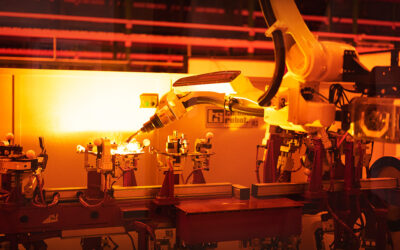The automotive industry has faced numerous challenges in recent years, most of which were caused by the outbreak of Covid-19. In particular, the microchip shortage has brought manufacturing facilities and production lines to a halt across the globe. This affects the entire supply chain across multiple industries, not just the original equipment manufacturers (OEMs) themselves.
Some of these supply chain disruptions are still taking place, which is putting pressure on vehicle prices and sales. Certain components are in short supply, which means that cars, bakkies and trucks are unable to be completed – or are being finished with sub-standard equipment in order to keep the assembly line moving.
Fortunately, Formex Industries is still operating efficiently and producing various components and welded assemblies for our direct OEM customers and secondary suppliers. Some of these disruptions have caused an increase in the cost of raw materials, which ultimately affects the price of a finished vehicle.
We remain committed to working closely with our customers and suppliers to find solutions to these supply chain interferences. Our product range has helped us to create some stability in the business as some components can continue to roll out where others may experience raw material shortages.
Sourcing locally will minimise disruptions
One of the most effective ways to minimise supply chain disruptions is to source materials, components and parts from local companies. OEMs and suppliers operating in South Africa should look locally for their specific products. There are well-equipped manufacturers in South Africa with the right machinery and expertise to produce simple or complex automotive components.
Localisation not only ensures better product delivery times and stronger lines of communication, but it also improves job creation and adds value to the nation’s economy. Vehicle brands have a lot to gain by sourcing parts from the country in which their assembly lines operate, rather than importing from various countries across the globe.

The industry relies on efficient international logistics
The automotive components industry relies on international shipping and efficient collaboration. For example, the copper for microchips is mined in Zambia and then shipped to China to be processed into a chip. These microchips are then sent to Germany to be inserted into fuel injection pumps. These are then shipped to another country, where they are fitted into the vehicles as they roll across the assembly line.
Any delays to one of these processes will affect the entire supply chain. However, if the microchip was shipped to South Africa to be installed in a fuel injection pump, then it would save a lot of money and time for OEMs operating in South Africa. This is the case for many vehicle components, such as catalytic converters, where the platinum is mined in South Africa and can then be processed into the final product by local companies, including Formex.
While supply chain disruptions are still prevalent post-Covid, manufacturers, suppliers and OEMs need to work closely to reduce these delays as much as possible. Localisation is one such solution that will alleviate supply chain pressures. For more information about our automotive components and products, please contact us today.
Formex Industries is a metal forming and assembly company that supplies a variety of complex products to the local automotive industry and the export market. The company is based in the Nelson Mandela Bay metropole, South Africa’s foremost region for automotive manufacturing and export.
Formex is a supplier with 69% black ownership, of which 37% are black women. The company is owned by Deneb Investments Limited – a subsidiary of Hosken Consolidated Investments Limited (HCI) – one of South Africa’s biggest true B-BBEE companies listed on the Johannesburg Stock Exchange (JSE).
Follow us on Facebook for the latest industry news and features relating to our products and services.





